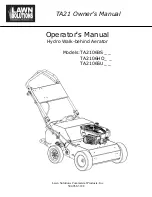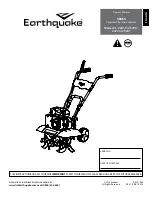
Section 5: Maintenance
B. To Drain the Transmission Gear Oil:
The transmission gear oil does not need
to be changed unless it has been contam-
inated with dirt, sand or metal particles.
1. Drain gasoline from the fuel tank or
run the engine until the fuel tank is empty.
See “DANGER” statement above.
2. Drain the oil from the engine.
3. Remove the four screws (B, Figure 5-2)
and washers from the transmission cover
and remove the cover and gasket.
4. Remove the left-side wheel.
5. Tilt the left-side wheel shaft into a
drain pan and allow the gear oil to drain
through the top of the transmission.
6. After draining oil, reinstall the wheel,
install a new gasket (do not reuse old
gasket) and screw on transmission cover.
7. Refill transmission using GL-4 gear oil
(SAE 85W-140 or SAE 140).
8. Refill the engine with motor oil and
replenish the fuel tank with gasoline.
TINES
The tines wear with use and they should
be inspected at the beginning of each
tilling season and after every 30 operating
hours. The tines can be replaced individ-
ually or as a complete set. See the
separate Parts Catalog for tine identifica-
tion and ordering information.
NOTE: You must first remove the tiller
hood before removing either a single tine
holder or individual tines. Remove the
two screws at the front of the hood and
the two screws at the rear of the hood
and lift off the hood. Be sure to replace
the hood securely after changing a tine or
tine holders.
A. Tine Inspection:
With use, the tines will become shorter,
narrower and pointed. Badly worn tines
will result in a loss of tilling depth and
reduced effectiveness in general, and
specifically when chopping up and
turning under organic matter.
B. Removing and Installing
Tine Assemblies
1. Use a 9/16" socket, 6" extension, a
ratchet, and a 9/16" box end wrench to
loosen the nut (A, Figure 5-3) and screw
(B) that secure the tine holder to the tine
shaft.
2. Use a rubber mallet to tap the tine
holder loose. Slide tine assembly off.
3. Repeat Steps 1 and 2 above to remove
the other tine assembly.
4. Installing the tine assembly is simply
the reverse of its removal. First be sure
to remove any rust, uneven spots or burrs
from the tine shaft using fine sandpaper.
Then grease the tine shaft before rein-
stalling the tine assemblies. Be sure all
the cutting edges face so they will enter
the soil first when the tiller is moving
forward– this means the cutting edge on
the top of each tine faces toward the
operator position. Tighten hardware.
C. Removing and Installing
Individual Tines
1. Use two 9/16" box end wrenches to
remove the two screws (C, Figure 5-3)
and nuts (D) that secure the tine to its
tine holder.
NOTE: If the nuts are rusted, apply pene-
trating oil, then loosen the hardware.
2. When installing individual tines, do so
in the reverse order from which they were
removed. The two sets of inboard tines
are installed so one set faces toward the
transmission and the other faces away
from it. The single outboard tine set
faces toward the transmission housing.
Also be sure the cutting edge at the top
of each tine faces toward the operator
position. (See Figure 5-3.)
Figure 5-2: Remove oil fill plug (A) to check
gear oil level and to add gear oil. Remove
four cover screws (B) to drain gear oil.
WARNING
Before inspecting, cleaning or servicing the unit, shut off engine, wait for all
parts to come to a complete stop, disconnect spark plug wire and move wire away from spark
plug. Failure to follow these instructions can result in serious personal injury or
property damage.
A
B
B
DANGER
Gasoline is highly flammable
and its vapors explosive. Fol-
low these safety practices to
prevent injury or property
damage from fire or explosion.
• Allow the engine and
muffler to cool before
draining the tiller’s gasoline
tank.
• Do not allow open flames,
sparks, matches or smoking
in the area.
• Wipe away spills and push
tiller away from spilled fuel.
• Use only an approved fuel
container and store it safely
out of the reach of children.
• Do not store gasoline where
its vapors could reach an
open flame or spark, or
where ignition sources are
present (such as hot water
and space heaters, furnaces,
clothes dryers, stoves,
electric motors, etc.)
WARNING
This is a CRT (counter-rotating
tine) tiller and its tines must
be mounted in the direction
shown in Figure 5-3. If
mounted with curves in the
opposite direction, tiller will
dig poorly and be more likely
to run backward.
Failure to comply could result
in personal injury or property
damage.
21








































